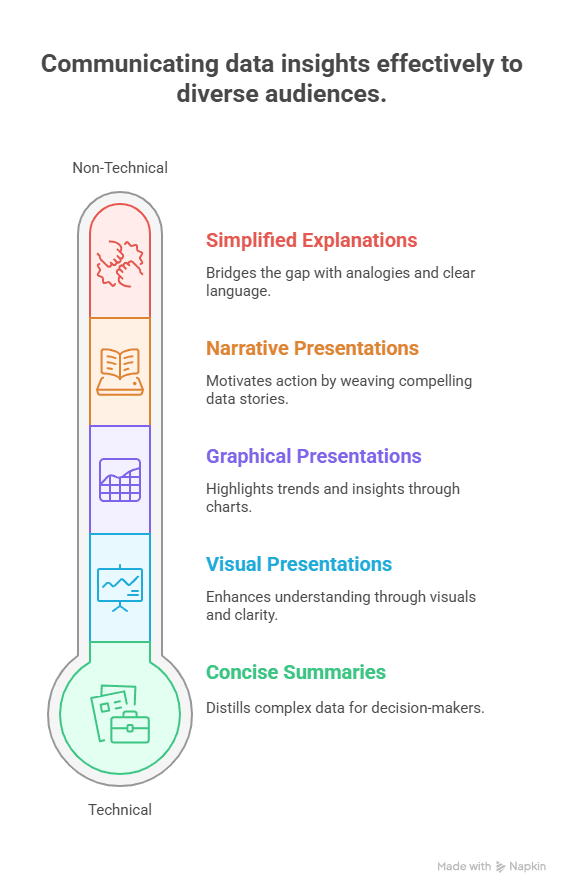
In the rapidly changing finance industry, acquiring the right financial analyst skills is crucial not only to differentiate yourself but also to enhance your earning potential. Did you know that some financial analysis skills can improve your salary by a whopping 40% or more? In this blog, I will reveal the five financial analyst skills that can drastically improve your pay scale. Beyond these five, I will help you understand the highly sought-after skills I am talking about.
These skills form the foundation for understanding how to analyse data for decision-making, consistently recognising prospects for growth in the finance industry and opportunities to monetise. Whether you are pursuing a career as a financial analyst or looking to advance your career with new skills, this information can support your career aspirations. Ready to find out how to make your pay cheque fatter? Let’s find out how financial analysis can impact your salary… stay tuned!!
Learning the Key Financial Analysis Skills: The Skills That Will Change Your Salary
If your goal is to excel in the finance analyst career path, you need to learn a specific skill set that is in demand by employers. Not only that, you need to learn skills that can significantly elevate your value and increase your salary by 40% or more!
- Data Interpretation: A financial analyst must understand and interpret complex financial data. Interpretation includes an understanding of financial statements, budgets, and forecasting models.
- Financial Reporting: The skill of financial reporting plays a vital role in financial analyst skills. It consists of the creation and presentation of reports that convey the financial position and performance of a company.
- Statistical Analysis: As a financial analyst, you are working with large data sets and need to derive information from the data. Therefore, statistical analysis skills are also a key skill. Analysis skills may include regression analysis, hypothesis testing, and so on.
- Knowledge of Financial Software: With technology, financial analysts must know their way around financial software programs like QuickBooks, Microsoft Excel, and SAP.
- Communication Skills: Although this may seem out of place among the financial technical skills list, communication skills rank high on the scale of key skills. Frequently, financial analysts must communicate financial information to audiences without a finance background. Hence, you should have solid communication skills.
As a financial analyst working hard to perfect your skills, those skills listed above will help you advance in your finance career and help you earn a higher salary. They will undoubtedly help you to be more efficient and effective in your work, but more so, make you a desirable candidate to hiring managers. Thus, if you want to increase your career advancement and salary as a financial analyst, it starts with developing the top skills listed above.
Improving Key Technical Financial Analysis Skills
As the financial field becomes increasingly complex, finance professionals must stay ahead of the curve. One way to do this is to develop and improve your technical analysis skills in financial analysis. Let’s take a closer look at the key technical skills that financial analysts should develop to raise their market value and increase their salaries considerably.
- Financial Modelling: Financial modelling is the act of creating abstractions of an economic situation. It’s an essential part of being able to make informed decisions when faced with uncertain predicted outcomes.
- Microsoft Excel: Excel is the essential tool in financial analysis. You will need to be able to use Excel with complex formulas, to create pivot table databases, etc.
- Data Analysis: As a financial analyst, your ability to extract meaning from complex data and transform it into actionable insights relies greatly on your successor’s understanding of statistical techniques, tools, and software.
- Accounting Skills: Financial analysis requires you to have knowledge and understanding of accounting practices and principles. This includes, but is not limited to, the ability to interpret balance sheets, income statements, and cash flow.
- Programming Languages: Programming languages, such as Python or R, can significantly enhance the effectiveness of a financial analyst in using statistics to work with large data sets and perform calculations.
| Technical Skill | Importance |
|---|---|
| Financial Modelling | Necessary for the use of statistics working with large data sets |
| Microsoft Excel | Very important for a Financial Analyst |
| Data Analysis | Very important for extracting content from complex data |
| Accounting Skills | Very important for interpreting financial statements |
| Programming Languages | Necessary for the use of statistics when working with large data sets |
In closing, the relevance of the financial analysis technical skills will vary in your career as a financial analyst, but they will make a world of difference. After you have developed these skills and fully understood and mastered a skill or two, the upper-level financial analyst roles, or possibly a management role, could present offers of salaries that are significantly higher than the average financial analyst salary. Do not stop there – finance is an industry where continuous learning and upskilling will lead to greater opportunities in your career.
Essential Skills for Financial Analysts
In today’s competitive job market, there is an increasing demand for financial analysts with a diverse skill set. Below are the top five high-demand analyst skills that can advance your career and raise your salary by 40% or more.
- Financial Modelling and Forecasting: These two skills are the foundation of anything a financial analyst does and require a thorough understanding of economic theory and the ability to apply that in real-life situations.
- Data Interpretation and Analysis: The ability to interpret and analyse data is growing in importance in the big data age. This skill requires an analyst to convert complex data sets into actionable business intelligence, which is part of a financial analyst’s job description.
- Excellent Communication: Although this skill is often underestimated, for a financial analyst, it is essential. Whether it is dealing with internal or external stakeholders, being able to present financial information concisely and understandably is a key trait sought by employers. Being able to convey complex financial data in written and verbal communications is essential.
- Financial Software Proficiency: Proficiency in financial software, such as Excel, QuickBooks, and SAP, enables faster and more reliable data analysis. Most employers expect their financial analysts to be proficient with these tools.
- Strategic Thinking: In the financial environment, this ability includes seeing the big picture, or long-term trends for the economic future. A strategic thinker develops strategies to advance the company’s sustainability and growth.
In conclusion, acquiring and developing the high-demand analyst skills mentioned above will not only enhance your marketability but also significantly contribute to your career development. As a financial analyst, these skills will help you navigate the intricate and daunting world of finance with confidence and clarity.
Unlocking Potential: Key Skills for a Successful Financial Analyst
In the fast-paced and expansive environment of finance, having the skills you need will positively impact your career trajectory and possibly your salary range. So, which skills are best used in finance jobs? We’ve highlighted five key skills that every financial analyst needs to know.
- Quantitative Analysis: The ability to review complicated financial data sets is a must-have skill for any finance position. More specifically, this means understanding statistical trends, creating financial models, conducting cost-benefit analysis, and other related activities.
- Financial Reporting: The ability to report correctly on economic data and provide recommendations is a vital skill. Knowledge of financial reporting software will also help, such as QuickBooks and Microsoft Excel.
- Attention to Detail: Finance mistakes can have far-reaching consequences. The ability to observe and identify inconsistencies, errors and anomalies within financial data is a critical skill.
- Strategic Thinking: Finance professionals must predict market trends and make strategic recommendations based on their company’s strategy and financial planners’ recommendations, while considering market risk.
- Communication Skills: Financial analysts often need to explain complex financial concepts in simple terms to clients/text, and other team members with no prior knowledge of finance-related work. Therefore, strong oral and written communication skills are an asset.
As a financial analyst, developing these skills will improve your employability potential and further earners potential as well. According to the Robert Half 2020 Salary Guide, professionals with these financial analyst skills can increase their salary by as much as 40%. Mastering these skills can be the key to your success in the finance industry.
Developing a High-Paying Career: Financial Analyst Skills that Matter
A top-notch financial analyst has a unique skill set that increases not only productivity but also earning potential. Here are 5 of the skills that can add to your analyst’s salary:
- High Skill Level in Financial Modelling: Financial modelling is a representation of a real-world financial situation. It enables analysts to create predictive models that forecast future economic trends, thereby enhancing their desirability.
- Advanced Excel Skills: A financial analyst with high proficiency in Excel can be both highly valued and highly effective. Many tasks can be completed quickly and accurately when one can manipulate spreadsheets, create pivot tables, and develop macros.
- Understanding SQL: The ability to extract and manipulate data with SQL can lead to more refined financial insights, thereby increasing earning potential. Furthermore, this gives an analyst the potential to broaden the role and value to the organisation.
- Strong Business Sense: Understanding how a business operates is essential to making strong, practical financial recommendations. The analyst with a strong business sense can be in a stronger position to negotiate a salary.
- Strong Communication Skills: An analyst’s communication skills are ideally positioned to relay convoluted financial information with ease and understanding. It is a fundamental skill that differentiates financial analysts from their competitors, opening doors to future promotions and a larger paycheck.
If you invest the time and effort to improve these financial analyst skills, you will be more capable, but also, more importantly, you will earn significantly more than an unskilled peer. A complete skill set is the secret to a successful, well-paid career in financial analysis.
As we’ve covered regarding financial analyst skills, Imarticus Learning offers the best financial analysis course to help you hone your skills and career potential. This in-depth course provides an introduction to financial markets, portfolio management, and corporate finance. It fits our blog’s focus on developing careers in finance.
Whether you are new to financial analysis and looking to build your financial analysis skills or an experienced financial analyst looking to upskill, this course will develop your financial analysis skills for you to get ahead in your financial analyst career. The course combines theoretical content with practical experience to ensure participants will be ready to meet the challenges of the business world. If you are ambitious about your career in finance, then this course could be the key to your success!
Frequently Asked Questions
What are the highest-paying financial analyst skills?
The highest-paying financial analyst skills include (and I believe it is very possible to earn 40% or more by having the following skills): financial modelling, advanced Excel, corporate finance understanding, data analysis and forecasting. By having all or most of these skills mastered, you will become a sought-after financial analyst and maximise your earning potential.
Why is financial modelling an important financial analyst skill?
Financial modelling is a crucial skill for financial analysts, as it enables them to portray financial situations visually. Financial modelling is essential for making sound business decisions, assessing a company’s overall financial performance and forecasting future financial situations. A financial analyst with excellent financial modelling skills can earn a bigger salary, simply due to the importance of this skill.
How do advanced Excel capabilities affect a financial analyst’s salary?
Advanced Excel capabilities are crucial for any financial analyst. Financial analysts use Excel primarily for financial analysis, analysis of data, and lastly, for financial modelling. An analyst with advanced Excel capabilities can perform complex financial calculations, build advanced financial models, and manage large volumes of data. Being an analyst with advanced Excel capabilities will open many doors of opportunity for you and could result in a huge salary boost.
Why is understanding corporate finance an essential skill for a financial analyst?
Corporate finance understanding is a critical financial analyst skill because it helps the analyst understand how businesses operate in economic terms. Corporate finance understanding covers such areas as capital investment, budgets, risk and profitability, and assessment of financial statements. If an analyst has a sound corporate finance understanding, then they can do a better job in their role and, therefore, receive a higher salary.
How will data analysis proficiency affect a financial analyst’s salary?
Data analysis proficiency is a must for a financial analyst, as it allows them to translate and interpret complex financial data, identify patterns and trends, and make informed data-driven decisions. This skill is even more essential today due to the multitude of information available to analyse and make the right decisions to outpace competitors. Because of this, a financial analyst with data analysis proficiency can reasonably expect a significant salary increase, as it enables informed decision-making.
What is the correlation between forecasting ability and salary for a financial analyst?
Forecasting ability is another important financial analyst skill. Forecasting ability is predicting how a particular company will perform in the future based on historical data and current market conditions, as well as specific economic indicators. Accurate forecasting ability can add substantial value to a company’s strategic planning and decision-making process. As such, a financial analyst with forecasting skills can expect a higher salary.





